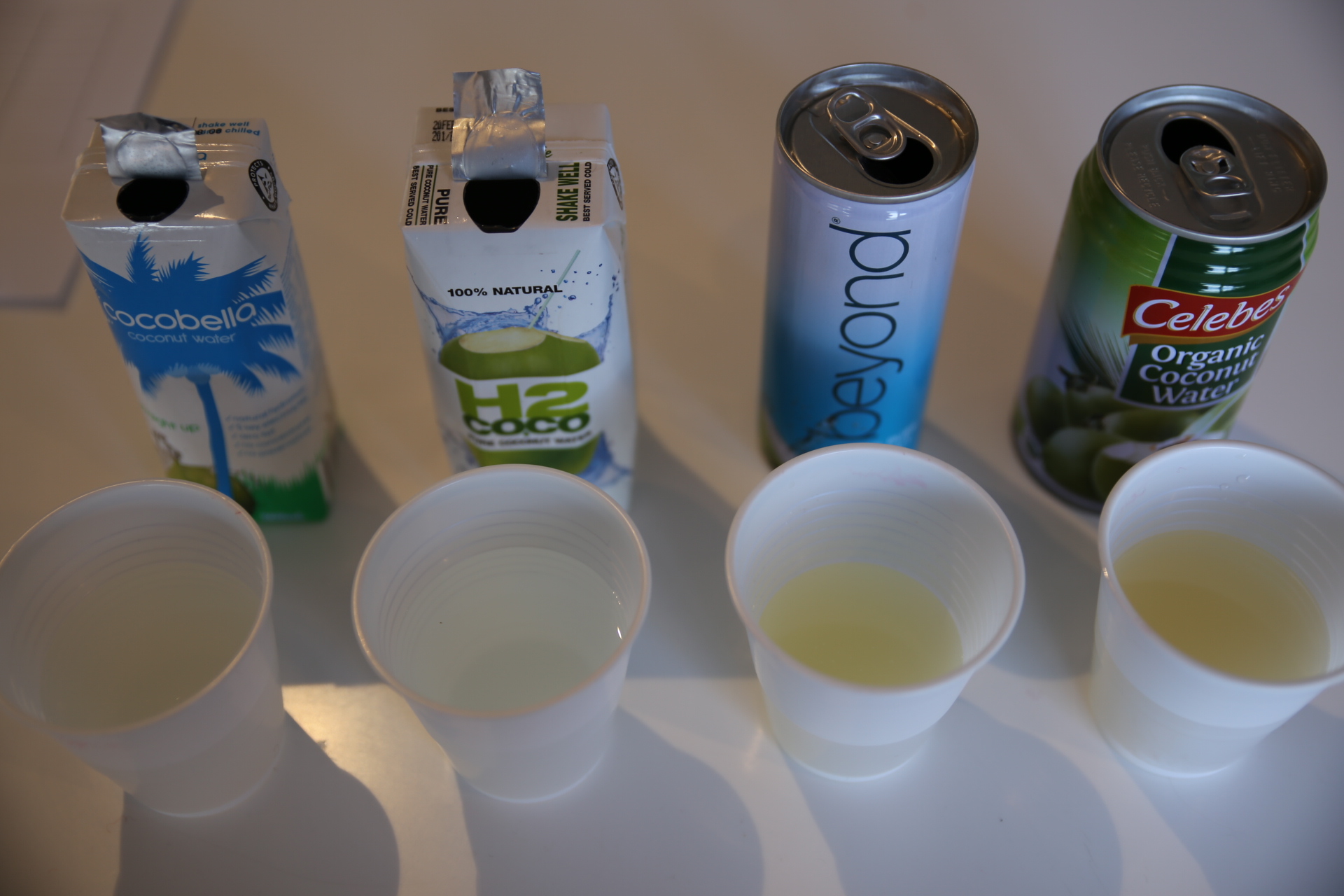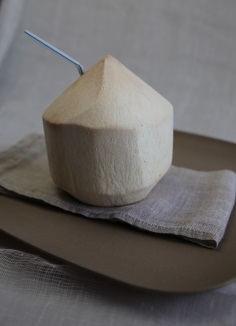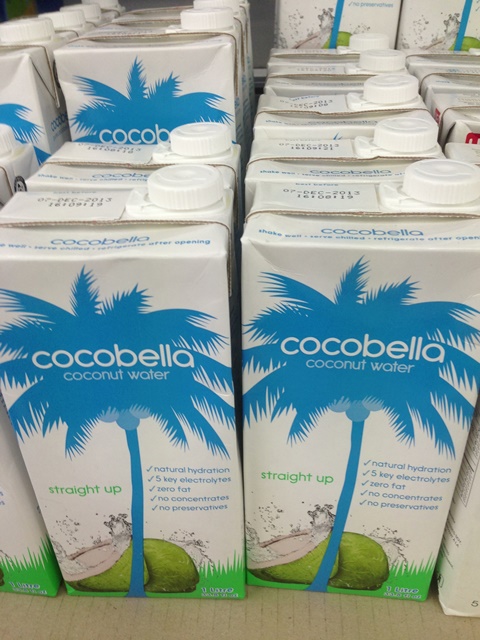Product review: Four Coconut Waters side by side
Written by Catherine Saxelby
on Thursday, 25 July 2013.
Tagged: coconut, healthy eating, healthy snacks, snacks

Coconut water is the new buzz beverage. Sales are skyrocketing, thanks to celebrity endorsements and the claims made on the pack for its high electrolyte and potassium content. Billed as "super hydrating" and something that will "refresh and revive you after a punishing workout", it's being marketed as somewhere between a sports drink and an ingredient for a smoothie. Are the claims true? What does it taste like? And is it worthy of all the hype?
We taste-tested four brands of coconut water and rated them against a whole green coconut (the one that you poke a hole into and sip with a straw) that we bought from a health food shop .
In the past, we had sampled Real and Kokoma (Schweppes) brands and found them to be not great taste-wise and they have since disappeared from the shelves since 2012.
I enlisted the help of three other taste-testers - Daisy, Astrid and John-Joseph. Astrid and John-Jo have travelled extensively in Asia where they've often enjoyed drinking fresh coconut juice straight from the coconut and they quite like it as a drink.
This was to counter my own preferences because, as of the date, I have not been a fan of the taste of these drinks nor do I care much for coconut as a flavour in cooking. I don't mind it in baking eg. a slice but not in savoury dishes, apart from curries.
Taste - combined rating of 4.5/10

Two were totally clear fluids, while the other two were creamy-yellow in appearance.
Celebes 5.5 / 10 (can)
Celebes received a huge variation with ratings ranging from 2 to 9. It was a little bitter without much of a taste and not all that sweet. In profile, it resembled more of a natural coconut. Re the name: I know Celebes is the former name of the island of Sulawesi in Indonesia but why does the word remind us of the word 'celebrity'? Coincidence?
Beyond 5.25 / 10 (can)
This had a markedly toasted aroma - quite pleasant, resembling toasted desiccated coconut from the oven - which was a more extreme version of what we got from the real fresh coconut. However, while this was fine for a couple of sips, it got overwhelming and too much for a whole glass.
The brand name Beyond left us wondering - there are mentions of coconuts on the front with a dead-simple blue and white minimalistic label giving no clue to what it was really - until you spotted the tiny coconut at the base.
Cocobella 4.75 / 10 (tetra-pack)
This was the sweetest in taste. It had no smell, no colour and – in appearance - you could be mistaken for thinking it was water – as was H2Coco (see below).
If you have never tasted coconut water before, this would be the easiest beginner's brand to start with as it was quite sweet with no other flavours.
However, our regular coconut drinkers were put off as they found it too sweet and not what they were expecting in a pure coconut drink.
H2Coco 2.5 /10 (tetra-pack)
This was the least liked of all. It wasn't sweet and it didn't give us any sense of a coconut taste. It had some weird underlying flavour that the four of us disliked immediately. It was pretty unpalatable.

Real coconut with a hole in it
 This was definitely the best flavour of all with a pleasing balance between a hint of toasted-ness, some sweetness and a refreshing natural taste. We used this as our comparison yardstick and it was definitely nicer even though we had no way of knowing how "fresh" it really was.
This was definitely the best flavour of all with a pleasing balance between a hint of toasted-ness, some sweetness and a refreshing natural taste. We used this as our comparison yardstick and it was definitely nicer even though we had no way of knowing how "fresh" it really was.
It was a Kulaway drinking coconut imported from Thailand. It yielded around a cup (250 mL) of coconut liquid which was about the same volume as the tetrapacks we tasted.
If you used your coconut water in a smoothie, say with mango or pineapple or other strong flavours, it wouldn't matter what it tasted like. For me, it was not gassy, which I liked.
Nutrition 15/20
Please read my overview on coconut water and how it stacks up compared to bananas and sports drinks. Some pretty amazing claims are made for its properties ranging from "super hydration" to "essential electrolytes" but I'm not blown away.
With an average of 90 kJ per 100 mL, it's low in kilojoules, virtually fat-free, low in sugars with no chemical preservatives. It's extracted from a natural product and not carbonated.
But it doesn't hit the mark with its potassium claim. Our comparisons show that it does NOT have more potassium than a banana or 100 grams of bananas. But it does have more than a sports drink which is designed to supply potassium (and sodium) to the body.
Coconut water from the whole nut is more 'natural' than a sports drink which is formulated in the factory but something has been done to enable the fresh coconut water to keep so long in the tetrapack or bottle.

Convenience 9/10
Like all juices, coconut water is almost too easy to consume. Just open and skull down. No chewing, no fibre, nothing to slow down your intake nor prevent absorption of the kilojoules.
It has a long shelf life of around 12 months for a tetrapack (24 months for the can) so some processing must take place during packing to ensure clean, sterile packing in poorer countries. Yes, the coconut water is sterile inside the young coconut but strict attention to hygiene at the plant must be adhered to as well. Perhaps the water is pasteurised or heat-treated to give it that long life.
Sustainability 7/10

The same applies to fresh whole coconuts which arrive already trimmed and shrink-wrapped in plastic. Both travel lots of food miles - which is a negative.
On the plus side, selling coconut water to the West provides employment to villagers and poorer people in tropical areas where there would be little work available. Though what wages they are paid and how long they have to work to earn a living are questions we'd like answers to. Harvesting coconuts is also quite a dangerous occupation with cases of injuries due to falling out of coconut trees.
Three brands are making some attempt to consider the environment (according to their websites):
- Beyond is a member of '1% for the planet' movement, donating at least 1% of their revenue to environmental organisations.
- Cocobella claims to source their coconuts from a "sustainable, ethical plantation in Indonesia".
- Celebes grows its coconuts using 'sustainable agro-forestry'. The company is certified as organic and Fair Trade and is a member of the Fair Trade Sustainability Alliance that works with farmers in the Philippines.
However, it's hard to tell how much is genuine and how much is smoke and mirrors.
Overall score 3 ½ apples

Total = 35.5/50
Bottom line
On its own, the taste is pretty unattractive but may be OK mixed into a smoothie or combined with a sweeter juice. Don't believe all the claims for rehydration made on the pack. It's only an average source of potassium and not much else. A real coconut is way more appealing than the packaged products we tried.
You may also be interested in...
Jemma O'Hanlon
The Good Stuff
The Boring Stuff
© 2025 Foodwatch Australia. All rights reserved
Website by Joomstore eCommerce





